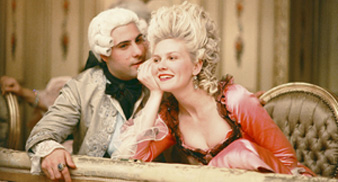Just screened in Cannes to a lukewarm reception, Sofia Coppola’s follow-up to her Oscar-winning romantic comedy Lost In Translation is a much less heavily stylised or adventurous film than many fans of the chic young auteur will be expecting. Although trailed as a “glam rock” period drama with a soundtrack full of post-punk and indie-rock luminaries, Marie-Antoinette offers a fairly straight and conventional portrait of the spoiled young Austrian princess who endured a lonely arranged marriage to Louis XV (Schwartzmann), then an untimely guillotine death in the aftermath of the French Revolution. Co-produced by Sofia’s legendary director father, Francis Ford Coppola, the film undoubtedly has artistic merits. Elegantly shot in the Palace of Versailles, its handsome vistas of old European aristocracy and their opulent, decadent lives recall Stanley Kubrick’s Barry Lyndon. The performances are mostly strong while Coppola's spare script is crisp and often witty. But the principle problem with Marie-Antoinette is its fundamental lack of drama. Coppola concentrates on the gossipy, bitchy, inward-looking comedy of court life in Versailles at the expense of any wider social or historical context. She even ends the film before her heroine’s bloody demise. The result is a disjointed, poetic character sketch which, at over two hours, feels like a missed opportunity. There may be a passionate, innovative, politically and emotionally charged film to be made from Antonia Fraser’s acclaimed revisionist biography of the teenage dauphine. But sadly Coppola’s muted, modestly enjoyable mood piece gets lost in translation. By Stephen Dalton
Just screened in Cannes to a lukewarm reception, Sofia Coppola’s follow-up to her Oscar-winning romantic comedy Lost In Translation is a much less heavily stylised or adventurous film than many fans of the chic young auteur will be expecting. Although trailed as a “glam rock” period drama with a soundtrack full of post-punk and indie-rock luminaries, Marie-Antoinette offers a fairly straight and conventional portrait of the spoiled young Austrian princess who endured a lonely arranged marriage to Louis XV (Schwartzmann), then an untimely guillotine death in the aftermath of the French Revolution.
Co-produced by Sofia’s legendary director father, Francis Ford Coppola, the film undoubtedly has artistic merits. Elegantly shot in the Palace of Versailles, its handsome vistas of old European aristocracy and their opulent, decadent lives recall Stanley Kubrick’s Barry Lyndon. The performances are mostly strong while Coppola’s spare script is crisp and often witty.
But the principle problem with Marie-Antoinette is its fundamental lack of drama. Coppola concentrates on the gossipy, bitchy, inward-looking comedy of court life in Versailles at the expense of any wider social or historical context. She even ends the film before her heroine’s bloody demise. The result is a disjointed, poetic character sketch which, at over two hours, feels like a missed opportunity.
There may be a passionate, innovative, politically and emotionally charged film to be made from Antonia Fraser’s acclaimed revisionist biography of the teenage dauphine. But sadly Coppola’s muted, modestly enjoyable mood piece gets lost in translation.
By Stephen Dalton


